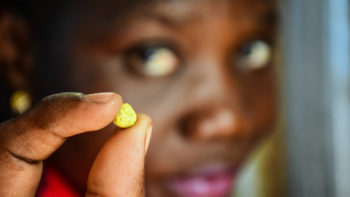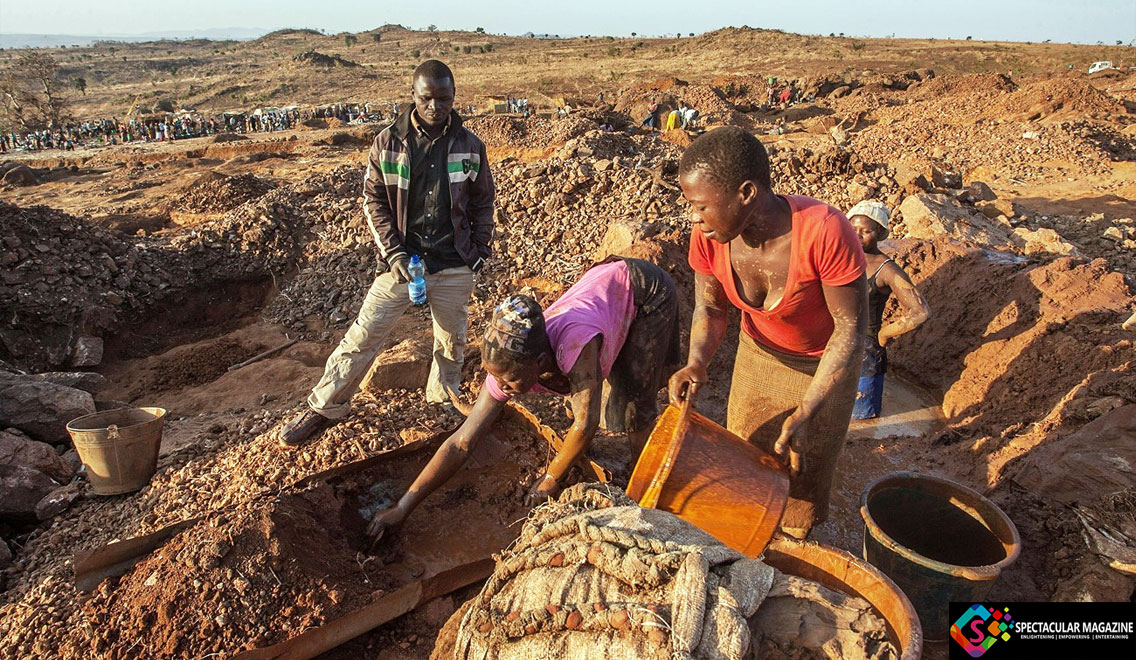She Is A Gold Digger: Women Strike It Big In East Africa
Teresa Samwel grew up with the superstition that women in gold mines bring bad luck. It was a man’s world. Now, she steps into her own small gold mine in a rural community near Lake Victoria, wrapped in a colorful kanga — a popular dress in the Great Lakes region — while the men standing by a makeshift mine shaft turn to greet her in low, humble voices.

Samwel, 48, is among the first women in Tanzania to call themselves gold mine owners, titles held here by men since colonial times. But she’s also among a growing set of women across East Africa shattering the glass ceiling in a male-dominated industry that feeds an estimated 100 million people globally.
Traditionally, women have often been barred from taking part in the actual digging or leadership positions in East Africa’s artisanal gold mines. Instead, they’re left with roles such as stone crushers, washers, food vendors or sex workers that are lower in status and pay less, according to a 2018 report by the International Institute for Sustainable Development. But more and more women like Samwel are now receiving support from a series of regional and international initiatives that are empowering them with greater influence and transforming the economic fortunes of their families and communities.
Since 2016, the Dutch nonprofit Solidaridad has trained 610 women miners in Tanzania’s northwestern Geita region. They have learned leadership skills, how to manage their finances and how to obtain a mining license. Twenty women now hold leadership positions in their mines.
Fairtrade Africa — headquartered in Nairobi — has helped hundreds of female gold miners increase their income. Since 2012, 411 women in Kenya, 292 women in Uganda and 487 women in Tanzania have benefited from Fairtrade Africa. The organization ensures equal pay in its partner mines, introduces no-discrimination policies and helps female miners legalize their businesses.
In the Democratic Republic of Congo, the Canadian organization IMPACT established loan associations for artisanal gold miners with female leaders back in 2017. Research by IMPACT showed that women were often prevented from accessing credit and denied leadership opportunities despite being members of informal savings groups. Now, more than 800 female miners and 650 men have established 50 loan associations, 80 percent of which have a female president.
These gains promise to help female miners find a path out of poverty, allowing them to build homes and educate their children. “I got a mining license in my name because I saw that gold pays, and now the mine helps me a lot,” says Samwel, who trained with Solidaridad.
Tanzania alone sits on an estimated 2,222 metric tons of gold and boasts the third-highest reserves of the metal in Africa. But while the failure of these reserves to translate into wealth for ordinary people has led to populist moves – Tanzania’s President John Magufuli has demanded foreign mining firms pay higher taxes if they want to continue exporting — the problem may lie, in part, elsewhere. While women account for about 40 to 50 percent of Africa’s 8 million artisanal miners, their average income is significantly lower than that of their male counterparts, according to the African Center for Economic Transformation.
That has a spillover effect on communities. An established body of economic research, including by organizations like the Organization for Economic Cooperation and Development (OECD), has shown that economic empowerment of women translates into greater benefits for their families and communities than similar levels of earnings for men. That’s a phenomenon that groups working with gold miners in East Africa are witnessing also.
“We are seeing that if women benefit from gold, they share with their families and communities,” says Winifrida Kanwa, project coordinator at Solidaridad. “Men are more likely to use their benefits on themselves.”
For sure, East Africa’s female gold miners still face major challenges, starting with deeply ingrained cultural norms that hold them back from pursuing influential roles in the mining industry, argues Theonestina Mwasha, coordinator at Fairtrade Africa’s gold program.
“We are not brought up to have confidence in ourselves,” Mwasha says. “So, if a man tells you to stop mining, most women will just accept it. Few have the courage to overcome this cultural attitude.”
Traditionally, men and women have worked separately in many of the region’s societies, performing very different roles. Getting them to work together isn’t easy either, suggests Elard Mawala, a Tanzania-based researcher from the Belgian research institute International Peace Information Service (IPIS). “The gold business can definitely help women,” says Mawala, but adds that at the moment, 80-90 percent of female gold miners in the region perform low-paying jobs.
But the region’s female gold miners aren’t sitting back and just waiting for those changes. They’re taking charge where they can — even when they don’t have support from regional or international groups. For years, 49-year-old Maria Kapula lived off the land with her husband in Lwamgasa in Tanzania’s Geita. When her husband died, she had to single-handedly support her family with gold from the nearby mine because she didn’t have training for a better job. Her village has now turned into a town with shiny houses, bars and a gas station because of the gold mine. She buys stones from the mine, crushes them on the neatly swept ground in front of her house, washes the powder and sells the gold to a local broker.
She has been able to build a house, support her children’s education and has helped with her son’s marriage — all thanks to the gold. “I have decided to do it myself, so I get all the profit. I can’t get the same amount from farming,” she says, while surrounded by her daughter and grandchildren in a cramped living room as Jesus watches over them from a poster on the wall.
Male perceptions are slowly changing too. A short walk from Kapula’s home, Justabike Mchungaji sits on the front porch of his new, spacious house. He owns a mining license for an area on the outskirts of town. Mchungaji, 50, says he’s fine with women entering the mining business. “I don’t see any problem with it,” he says. “They can help the community if they get more money.” Mawala also believes that with “basic business skills, formalization and financing,” more women could take charge of gold mines.
Samwel has seen what that can mean. Not only is she able to send her own children and grandchildren to school, but she also supports the local primary school by providing needed supplies. “As a mine owner, I can help the community,” she says. “It has made me respected here.”


